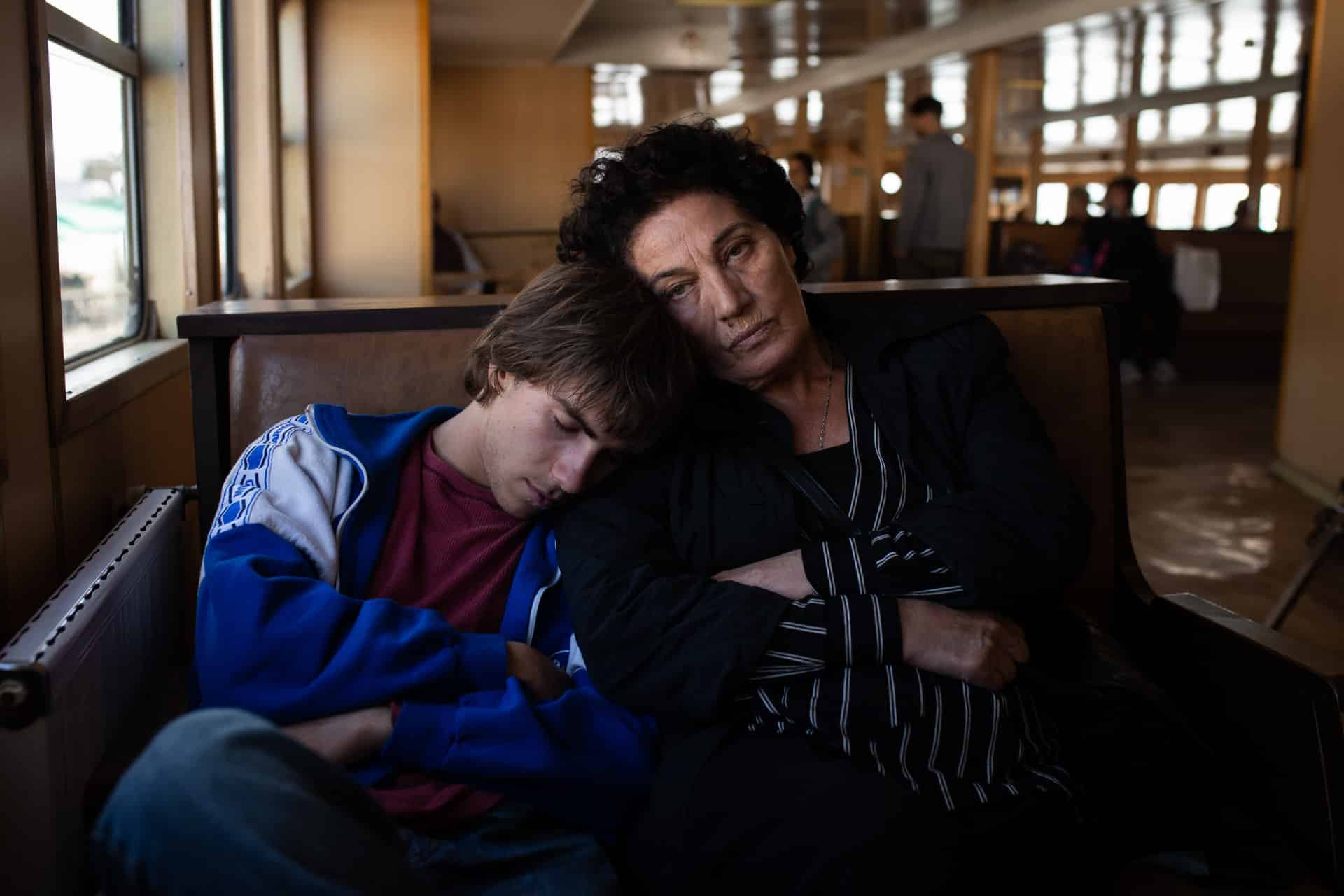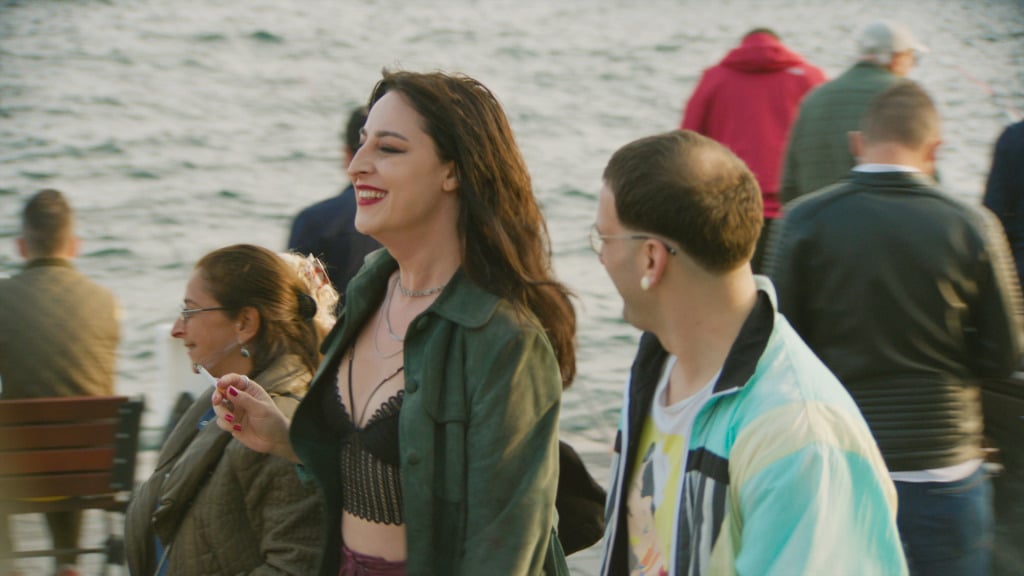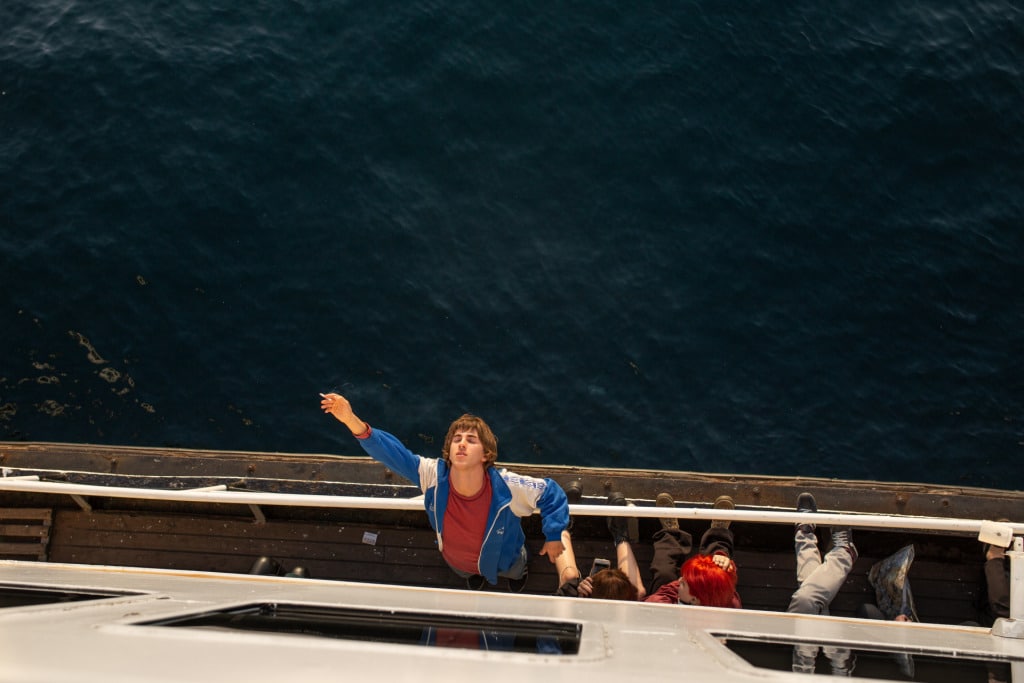
“If we were in Istanbul now, there would be like a cat walking there and one up there.” I am talking to the director Levan Akin on the fourth floor of an office in Kings Cross, with a view onto commercial building developments. His latest film, Crossing, which is set largely in Turkey, is populated with cats. “It’s also showing how we all share space. To the seagulls, Istanbul is their city. The cats own it in their mind.”
Crossing, Akin’s follow-up to queer dance drama And Then We Danced, is a film about the way we traverse, share and occupy space. In the opening scene, Lia (Mzia Arabuli) is walking across the coastline toward a cluster of houses where she hopes she might find Tekla, her trans niece who has run away from home. Here she meets Achi (Lucas Kankava), a young man unsatisfied with his life. Seeing an opportunity for escape, he provides Lia with a fake address of where Tekla is. The odd-couple trajectory between the retired, unmarried, Anna Magnani-esque schoolteacher and the chippy chappy intersects with that of Evrim (Deniz Dumanli), a trans lawyer based in Istanbul fighting the good fight for her LGBTQI+ sisters. As their search for Tekla becomes increasingly unfruitful, other forms of internal voyages occur—dances of the heart and mind—all which beg the question of who is really looking to be found.
Here Akim speaks to A Rabbit’s Foot about bridging generational divides, animal rights and embracing earnestness.
KG: Both And Then We Danced and Crossing start in the city of Batumi—what is the significance of this place?
LA: Practically, it’s like the second largest city of Georgia. A big city by the Black Sea, [for Georgians] people from Batumi are a bit like how we think about Spanish people. They’re more southern and suave. Like the character of Irakli, he’s a bit of a trickster figure. It’s the region my ancestors are from, so I’ve always had this affinity for Batumi and the surrounding area.
KG: I guess Batumi is also a way for you to establish the idea of an outsider?
LA: Yeah and also the local flavours of a country. Not a lot of people knew about Georgia until they saw And Then We Danced, and I think it’s fascinating to go on a journey in a film and learn about a new country. The way they talk about Irakli you wonder if he’s different because he’s from Batumi so you start to google—that’s the way I like to see films. When I’m here in the UK I’m constantly wondering where are you from, what’s the difference?

KG: Do you think, having grown up in Sweden, you almost have this more pronounced view of Georgian culture?
LA: Yeah, and it’s weird because I’ve been working abroad for so many years, I’m also starting to see Sweden with outsider eyes and starting to see our behaviour in a different context. So maybe I’ll do a film about Sweden because I’m not so blind to it anymore. Sweden is very conformist. They’re very anxious to fit in. Humility is a big thing in Sweden, but a lot of the time it’s very fake.
A lot of Swedish filmmakers have explored that awkwardness. I think with my films I try to approach [my subject] with earnestness, because that’s something I miss myself in film. There’s almost an aversion to it. Everything is very cynical and I think Crossing is very much a reaction to that in the themes I explore: solidarity and empathy. We are living in quite precarious, dark times. But also there is so much friendliness. So personally I thought that would be a breath of fresh air.
When And Then We Danced came out there was so much polarisation happening in Georgia. There were so many riots against the film, and they had to call in the military and the police. People that tried to see the film in the cinema, like in Game of Thrones, they were shouting ‘shame! shame!’ at them. We could only screen it for 3 days. There was this whole narrative about the post-Soviet generation versus the soviet generation. The older, bigoted people versus the younger people. Which is true, in part. But it’s definitely not black and white. The only people that gain from that kind of polarisation are the oppressors. This film, from my end, was very much a conscious effort to try and bridge that gap.
KG: It’s very much a film about Lia’s self-expression.
LA: You get a sense of her being a woman who didn’t want to subjugate herself to a man, because she was never married. But there’s a lot of self-loathing because she talks about those women on the bus as being ‘slutty’. I think that is something I’ve seen a lot myself with women around me in Georgia, where it’s like, ‘I don’t care what men think’, but then they are so conditioned by the patriarchy that they fall into the same thinking patterns that limit women.
KG: In Crossing dance remains to be an important trope. In particular the scene where Lia gets drunk and dances like she did in her youth. What is the power of dance?
LA: It’s such a good way to express so many things without dialogue cinematically. In the end between her and Achii and Evrim, I wanted to show that she feels this way and he feels that way and Evrim feels something else. But how do I bridge the gap between Achii and Tekla and Lia? Through dance. There’s that moment in the car where she sees Evrim with the driver and I think that moment is really transformative. Because for Lia ‘love is love’ and that could be Tekla, and it’s fine. But there is also sadness in her eyes.
KG: At the beginning of the film there is a disclaimer that there is no gendered language in Turkish or Georgian. How do you think the viewing of the film might be affected for people who speak gendered languages?
LA: I mean some nuances disappear because even though there’s no gender there’s still a tone and value in how you talk about a person. Like when she says in the beginning ‘She calls herself Tekla’, in Georgian it’s ‘it calls itself Tekla’. But I don’t think it matters overall. We put that there as we were worried the subtitling of the movie was going to be tricky. You can still misgender a trans person in other ways, but not by he- or she-ing them.

KG: I liked the way Evrim is introduced at the moment when Tekla would be, and for a while when I was watching I thought it might have been her. Was this sense of confusion deliberate?
LA: I wanted to know how I could activate the viewer. When I’m watching a film, I want to be on the edge of my seat thinking, is that her? Because then you can have a lot of exposition and give people a lot of colloquial information at the same time. It’s a way for me to lure you in on her path. I’m glad it worked because many people have said the same thing.
KG: Evrim seems to present this positive possibility of what Tekla’s life could look like.
LA: That’s what it was. And maybe it could have been Tekla. Maybe it is Tekla—maybe she is in Greece or something, living that life.
KG: How was it to work with these non-professional actors–Achi and Tekla?
LA: I use amateurs in the roles because I have a very specific idea of the energy that I want them to inhabit and a rawness. Also practically there aren’t that many trans actresses or actors. The film was very difficult to cast because all of those smaller roles in Turkey, if they’re not 100% believable, you’re taking out of the illusion. Luckily, we had a trans casting person for all of the trans roles in Turkey. We had a lot of people from the community working on the film.
KG: I also loved the smaller roles—of homeless children but also animals and cats that appear on screen too.
LA: It’s also showing how we all share space. To the seagulls, Istanbul is their city. The cats own it in their mind and the humans own it in theirs. I’m an animal rights activist, so on the one hand I’m like these poor cats. But also cats and dogs are adored here. Although there’s a horrible law in Turkey where if a dog isn’t adopted within 30 days, they kill it. But having said that, Tukey is a country that hasn’t removed all the animals like here or in Sweden, where it’s just humans and birds. If we were in Istanbul now, there would be a cat walking there and one up there.
KG: Do you see this film as a series with the first film? Could it become a trilogy?
LA: I do think they are very connected. One wouldn’t exist without the other. Each film is moving away from Georgia. My first film dealt with Georgia, the first one went to Turkey. My next film deals more with East-West wealth disparity. A lot of directors talk about trilogies, but it’s an after-construction. Why do we have to wrap things up and have this narrative? It’s probably not a trilogy. It’s just a journey I’m on.
Crossing is in cinemas in the UK & Ireland from 19th July 2024 and streaming exclusively on MUBI from 30th August 2024.





